|
It's hard to believe that over 10 years have passed since I first moved to Clarkston, was introduced to Embrace, and attended my very first birth with a refugee neighbor. These past 10 years have been so full. So full of excitement and new life, of struggles and pain, and finding joy and love on the other side and through those difficulties, very much like the process of labor and birth. I've had the privilege of getting to work with incredible team members at Embrace, partners in the Clarkston area, and getting to serve alongside, pour into and be poured into by hundreds of incredible volunteers and supporters. No, I'm not leaving... I know a paragraph that starts like this may sound like that :) However, a bit of change is on the horizon for me. I am so blessed to get to take a 4 month sabbatical and when I return will be transitioning my role a bit. More on that to come. But, I just wanted to take a moment for gratitude for all the blessings of these past 10 years, these blessings that include each of you who make this good work possible. Every now and then the question gets asked in a group or conversation, "What is your dream job?" and I think it's pretty cool that I always get to say, "I have my dream job, at Embrace!" See you all in a few months when I return!
1 Comment
by Lorene Flewellen
I met Paw when I went to pick her up for a prenatal appointment. This was my first assignment with Embrace and I was not sure what to expect. Although we do not speak the same language, that did not seem to matter at all. Paw is a gracious, kind and caring person. We somehow were able to communicate the important procedural things, and later, when we got to know each other better, we began to share laughs and joys over the small things in life. Over the course of several weeks and months, Paw and I spent time in the car together, giving her a chance to practice some of the English she was learning, and later, her four-year- old daughter joined us, as we dropped her off for childcare before appointments. One day, I needed to pick up some paperwork at Paw’s home, and my husband was with me. I went into the house, but she insisted that my husband, who was sitting in the car, come into her home so we could meet her whole family. This was such a joy and privilege. I was able to sit with Paw during several ultrasounds and we both looked at her beautiful unborn baby in awe. We commented on his hair and how big he looked. Again, we did not need the same language to get these feelings across. Early one morning in February, I got a call letting me know that Paw was having steady contractions and was going to the hospital. I met her and her husband there 45 minutes later and made sure that Paw understood all of the questions she was being asked and that all was explained well so she could make good choices. I stayed with Paw and her husband that day for 14 hours, making sure we had good translation, that Paw had time to think about the questions she was being asked (no emergencies here), that her husband had food, that the nurse understood some important background about Paw’s previous birth experiences. I am not medically trained, but I did not need to be, to serve Paw that day. Sometimes we do not understand how important it is just to be present and walk with someone on their journey. I am so proud of Paw because she was able to make her own choices that day and welcomed a beautiful baby boy into the world. I love going to Paw’s home to visit her and her family. We sit on the floor together, with baby boy sleeping soundly on a little bed close to his mom, and little sister shows me her favorite toys, while big sister is at school. Paw’s mother gives me a big hug and offers me a drink. I feel so welcomed there and so blessed to have Paw as my friend. by Heidi Miller Copeland Will you support me during my pregnancy because I didn’t have a good experience with my last birth? Will you help me change providers because I’m too intimidated to tell my doctor I want to switch practices? It’s not uncommon for us to get these types of questions from women coming to us at Embrace, but for some reason, a recent particular request struck a chord and reignited my passion for what Embrace is really here for- to help create safe space for women to birth in just, equitable, and empowered ways.
She told me her first birth in a refugee camp was wonderful. She had a midwife who supported her and stayed with her throughout her birth. It only lasted 4-5 hours and was hard work, but wasn’t excruciatingly painful. She felt empowered and supported. But, her second birth, in a US hospital was quite the opposite. She was induced, was left alone most of her labor with only her husband in the room with her, and when the nurses and/or doctor were in the room, they were anything but kind to her. She said, “I know it was hard for my providers to take care of me, but when they were unkind, I felt the labor pains get worse and worse. It was awful. During my current pregnancy, I catch myself feeling shortness of breath and a tight chest. I’m afraid to go to the doctor.” I told her that no one should be treated the way she was and that she has every right to change providers and that we would be alongside her throughout that process and try to find her a provider who could better care for her. Why is this situation so alarming? Over 30% of birthing people will have psychological trauma from the experience (Krysta Dancy, birthandtraumasupportcenter.org). Why is this the case? Is it because birth is just hard and painful? Is it because of medical interventions? The reason is more nuanced, but is centered in the fact that birthing people are in an extremely vulnerable place physically, mentally, and emotionally during pregnancy and birth. Birth can be the most empowering, strengthening, enlivening experience of a woman’s life if she has what she needs to reach that potential. However, it can also become a traumatic experience that haunts her for years after. Because of this, the support that a birthing person receives during pregnancy, labor/birth, and postpartum is extremely important. If a birthing person doesn’t feel empowered and supported during this process, they are exponentially more susceptible to experience trauma. This is why we do what we do at Embrace. The women we work with are often more at risk to experience this type of trauma and harm because of many of the barriers and inequalities they face. But, we at Embrace also know there is a different way for them to go through the beautiful process of birth, a way that is deeper and truer. We know that these women come from many generations of strong women who birthed in spaces surrounded by other women with long traditions and cultures of strength and empowerment, meaning and normalcy around the birthing process. We learn from this history, seek to protect this lineage and not have it destroyed by a medical system that is not set up for these women. And we seek to speak this truth to the system and perhaps little by little, birth by birth, we are showing a broken system that there is a better way. This is our hope. May this work continue to be done until every birthing person is empowered and supported in their experience. Rahina Kamal is one of those women you meet and realize- she is changing the world. Rahina sees herself as reborn. She has gone through the fire and emerged so brilliantly strong and resilient. The beginnings of Rahina’s story start with her childhood in Burma. She has a very loving family of a mother, father, eight brothers and three sisters. When she was 16, she left home to move to Malaysia to be married. This is where things turned upside down. Rahina’s husband was very abusive and when she was pregnant within 3 months of arriving in Malaysia. He was very upset because pregnancy and birth in Malaysia as a foreigner are very expensive. He wanted to sell their child when she was born to make up for the costs, but Rahina refused to allow this. So he beat her and left her on the streets to die. Some very kind Chinese foreigners who had a shelter took her in, brought her to the hospital, and cared for her until she gave birth to her sweet little daughter, Yasmin. During this whole process, the people who were caring for her helped her apply to come to the US as a refugee through the UNHCR. The people from the UN were very kind to her and helped her while she recovered with hospital needs, counseling, and other support and she is forever grateful for their kindness and support. This is how she came to be in Georgia. Rahina’s body and mind were very harmed because of everything she experienced in Malaysia and so her refugee resettlement agency helped her find resources to help with the healing process. Meanwhile, at Embrace, we had begun getting referrals for women from the Rohingya community and didn’t have anyone to help interpret. A few friends of Embrace referred Rahina to us as someone who could help, but who also needed some meaningful work. And so our partnership began. Rahina has since had another child in the US, supported by the team at Embrace and has helped create a blossoming, beautiful community among Rohingya mothers, supporting one another and leading each other to be empowered in their health journeys. When Rahina speaks about this experience of coming to work at Embrace, she says, “I’m so happy now that I’m helping people. Before, I was having migraines all the time, but now my migraines are gone! And I’m so proud of the work I do at Embrace because I’m also setting an example for my children to be strong, overcome hardship, stand up for themselves, and care for their community. My mother birthed me once, but Embrace has birthed me anew again.” By being employed at Embrace, Rahina’s whole life has changed- her body and mind are healthy again, her English has improved, she has a way to support her family, and she is raising her kids in a strong community that cares for one another well and doesn’t put up with abuse or mistreatment. Rahina is a strong force at Embrace and an even stronger force in her community. She is now taking the joy and strength of her rebirth and sharing it with her family and community. And she is changing the world because of it. A few members of Rahina's Embrace Family - Heidi, Rahina, Virginia, and Aku
"Alone, we can do so little; together we can do so much" - Helen Keller 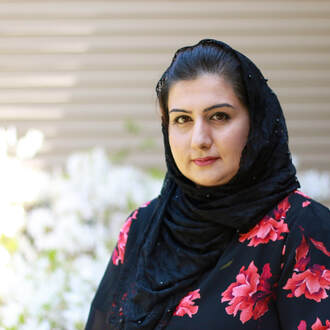 The ability to face adversity and rise above it is a muscle Shaista has been strengthening since she lived in Afghanistan. Shaista and her family first came to the United States in February of 2017, just two days after the executive order that temporarily suspended the U.S. Refugee Admissions Program (USRAP) and almost halved the number of refugees allowed into the country that year. Although she had given birth to two healthy children, she struggled with infertility for another six years, undergoing various treatments that can have very exhausting side effects. When Shaista finally celebrated the success of a third pregnancy, the joyful tone was muted as doctors told her it was a high-risk pregnancy because of an umbilical chord anomaly; they told her to prepare for poor outcomes, including preterm delivery and low birthweight, which can bring an entirely new set of challenges. Throughout this time, Shaista had also been pursuing a dream of starting her own catering business. Her husband supported her dreams and her work outside of the home by sharing in childcare duties and encouraging words along the way as a true partner in life and work. She put herself and her business idea through rounds of presentations and feedback through the program, Start:Me, which also paired her with a mentor to help her towards becoming a successful entrepreneur. Just after giving birth to her third child in 2019 - a beautiful, healthy-sized boy! - Shaista worked incredibly hard to get access to a commercial kitchen for her business, Amani Catering. Shaista pumped at work for her newborn and began to grow a team of seven women who found true joy in their work together - cooking, community, and success. When COVID-19 suddenly forced entire nations and their businesses and infrastructure to shut down, Shaista realized she would have to do the same for the safety of her customers and community. Although she unfortunately had to close the doors to her business in 2019, she never closed to the doors to working with and serving women in her community. Shaista continued to help others figure out how to file paperwork for appointments and Medicaid and navigate the various systems in the U.S. throughout the pandemic. It is no surprise that her resilience, skills, and positive attitude were noticed by leadership, and helped her secure what soon became a full-time caseworker position at Refugee Women’s Network (RWN). To this day, Shaista has helped over 100 families in her community with things like rent assistance, social adjustment needs, ESL classes, and finding employment opportunities through her work at RWN. She is also a part of RWN's "Chef's Club" program, where she is able to help other female entrepreneurs who want to start their own catering businesses, which she understands more thoroughly than most due to her experience before and through COVID. Yet Shaista still has more contribute to the community - she also works with Georgia State as a Safe Care Provider to help provide training and education to families around improving parenting skills. If that weren’t enough, she also works with a program to share laptops with families and train them how to use them, an incredibly empowering experience she says, “because you don’t have to know English to be able to use a computer.” Shaista exemplifies the word resilience - she has bounced back stronger, more creative, and more capable of supporting and empowering women throughout her community in spite of the pandemic that shut down her small business. Not only does she continue to cook delicious meals for people in her family and community, but she also continues to dream of re-opening Amani Catering so that she can provide work opportunities to "other women who are struggling to find a suitable job due to language and other barriers." When invited to share any words of encouragement with other mothers, Shaista notes, “Mothers are so, so strong. Motherhood is a challenging phase, especially when you are an immigrant mother. But always remember that motherhood doesn't have to limit you from any opportunities - working gives you strength and helps you feel powerful about yourself. A mother can do any job she chooses!" “My hope is that the people in my community that I help will become independent someday and then they can go on to help others in our community as well,” Shaista says. She cannot help but share the love. Shaista, we see the power you hold within you, as it shines and encourages all those around you in your family, workplace, and community. You are a true Shero, and we thank you for sharing your story of resilience with us! “Mother’s love is the fuel that enables a normal human being to do the impossible.” - Marion C. Garretty 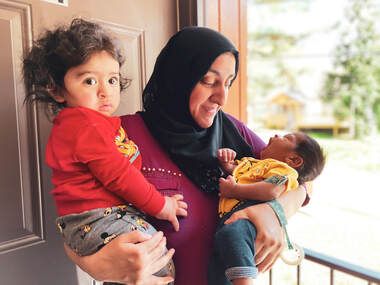 Have you ever felt like you’ve truly lost sense of time? That one day blends into the next, and you can’t remember when you last ate, or fed the kids, or if you celebrated your friend’s birthday last week or last year? For many of us, pandemic has brought this haze over our sense of time, where simple acts of feeding, cleaning, work-related tasks, and even leaving the house take monumental effort. For mothers of newborns, this brain fog is a common experience, which makes the fact that Hanan has birthed, nourished, and cared for not just one, but two, infants in pandemic all the more inspiring. Hanan is someone who greets visitors at her door with a huge smile, welcomes them into her home, and serves food and drink as she chats with them, as if they’ve been neighbors for years. Yet Hanan's hospitality and desire to befriend others was certainly challenged when she first came to the United States from Iraq in 2014. When Hanan entered the last trimester of her first pregnancy, the U.S. entered lockdown because of the emerging coronavirus, and people were discouraged from leaving their homes except for absolute essentials. This social isolation was incredibly challenging for many of us, but particularly difficult for new mothers who depend on community, and especially for women like Hanan who were not only first-time mothers, but brand new to the U.S., the healthcare system, and the cultural practices around birth and motherhood. In spite of all these challenges, Hanan pushed through the fog of new motherhood and pandemic and found herself strong and capable to nourish her infant, develop relationships with neighbors, and educate herself on what to expect at prenatal visits, how to ask for risks and benefits before every intervention, and her rights as a patient. Hanan gave birth to her second child in pandemic in February, and with the support of her husband and new friends, has continued to thrive. “There are many stressful times, but I know that I will get through it,” Hanan says of this foggy season. As we talk for this interview, she simply exudes resiliency of motherhood - she’s feeding her newborn, holding her toddler, chatting with us, rocking, comforting, smiling. “When I care for my kids and they are happy and healthy and smiling, this gives me great joy,” Hanan shares. When we asked Hanan if there was any encouragement she’d like to share with other mothers in this time, she “invites other moms to be patient with their kids when they are small like this, when they are home all the time. Because they will grow up fast, so enjoy this time with them… My first baby is one year now, and the time has gone so fast.” Thank you, Hanan, for showing us what a nurturing, strong, and empowered mother looks like. We are moved by your story, and honored to know you as a true Shero this Mother’s Day. Honor a Shero in Your Life:
Make a Donation Today and Embrace Will Send Your Honoree a Card “Birth is not only about making babies. Birth is about making mothers — strong, competent, capable mothers who trust themselves and know their inner strength." —Barbara Katz Rothman 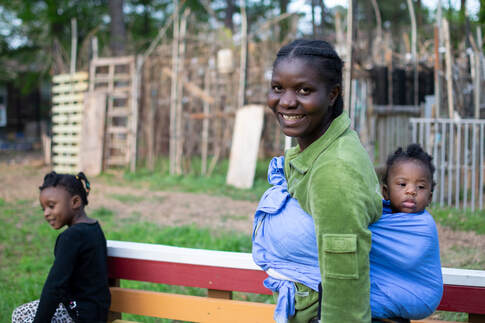 Studies have shown that giving birth can be more physically taxing than running a marathon. Most people who run a marathon have typically spent months of training, perfecting their race-day diet and routines, knowing exactly what distance they’ll run and a general idea of their expected results. However, mothers in labor begin their ultra-endurance athletic event without any such guaranteed course map, distance, or even outcomes. Childbirth can be the most unpredictable of major life events - with arguably the most cherished prizes - and still requires incredible energy, flexibility, mental fortitude, and physical strength, and that is why its participants should be considered Sheroes among us. Judith* is exactly that - a true Shero among us, who gave birth under the extraordinary circumstances of pandemic and personal challenges, and has come out stronger and more courageous than could be imagined. Although Judith had given birth three years ago in the United States, 2020 was a different environment all together - a completely new terrain, with unclear rules that changed constantly, and with a serious, scary threat to every person’s health. Yet the strength required to give birth remained and arguably intensified because of all these factors. When Judith went into labor last fall, in the midst of this uncertain environment, she was home with only her preschooler by her side; her partner was in Africa, unable to join her. Yet she faced this challenge with courage and faith as only a mother could. She trusted herself, drew from her own inner strength, and began to face each contraction with determination to see it through, one at a time. Thankfully, Judith’s labor course was short this time around, and she gave birth in her own home as it were, with an Embrace team member by her side before an ambulance could arrive for transportation to the hospital. In witnessing Judith give birth this way, Heidi Copeland says, “Judith clearly drew from an inner well of strength as she delivered her baby that day. It was such a joy and privilege to get to witness such incredible power and grace in the work of bringing new life into the world.” Our Shero, Judith, shares some words of wisdom to other people running the race of their lives: “Of the things that keeps me going - one of them is determination... I know that there are other people that have been through worse than I have been through, I know that, but I am determined that nothing is gonna stop me pushing. So, in life I guess every woman has to be determined… “And also I believe that I have a brighter future ahead of me. I know that. I strongly believe that. Those are some of the reasons that make me to be really strong and courageous, but God is the overall or the center of it all, He keeps me going because it’s actually not by my strength - neither by my wisdom or not even anything that I’m getting or any support or whatever - but I believe it is God that is keeping me going.” Judith, thank you for your determination, inner strength, and courage, and for sharing it with us at Embrace. You are a Shero among us! Happy Mother’s Day! *Name changed for privacy reasons ** Photo credit to Kurt Rosenhauer
and allow the interpreters to share the information their respective languages. At one point, whatever I'd said generated a few giggles, then some louder laughs, and a finally a couple of questions from the women in the room. As I did my best to share what I knew, I realized I felt less a teacher in that space and more a student. Together, we shared that awareness of women's intuition and knowing about difficult things and our bodies that couldn't be perfectly translated, but could be more fully understood if we remained open to one another.
As an Atlanta native, I feel right at home and halfway across the world while being in my neighboring community of Clarkston, often described as "the most diverse square mile in the United States." I am incredibly grateful for my experiences as a Morehead Scholar at UNC-Chapel Hill, where I pioneered an International Studies curriculum that gave me the opportunity to live and work in east Africa with women and their families. While researching my thesis on the HIV/AIDS crisis in Rwanda, I developed a love for maternal-child health and resolved that all women deserve access to culturally sensitive healthcare. As a Fuld Fellow at Emory University's School of Nursing, I recognized that nurse midwives have a unique opportunity to walk alongside women in pregnancy and childbirth, empowering them with knowledge to make healthy choices for their families. I then worked as a Certified Nurse Midwife with Kaiser Permanente at Northside Hospital, "catching" nearly 400 babies and helping countless other mothers throughout their pregnancy and childbirth. Since that first experience at Embrace, I haven't been able to leave. Jenny, Heidi, and the rest of the team have made me feel like a part of the family from day one. After the birth of my third daughter, I joined the advisory council at Embrace and the executive board of Friends of Refugees, serving as its chairperson from 2018-2020. I am thrilled to be with the Embrace family again in this new capacity as Director, and proud to introduce my three girls, friends and communities to all the wonderful people who continue to teach me and shape me in the most beautiful and unexpected ways. My hope is that our Embrace family can continue to grow and find those moments of mutual learning from one another that allow for all women and their families to thrive. 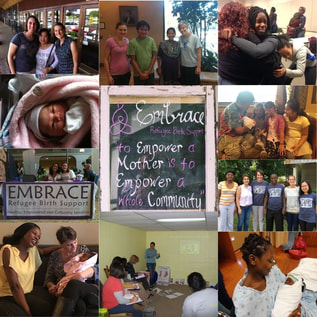 In 2011, I met Jenny Cochran and Liz Johnson on the living room floor of my dear friend who had recently moved to Clarkston as a refugee from Burma. She had been a midwife in a refugee camp in Thailand and despite her limited English, my friend and I quickly became involved in Embrace. She became an interpreter for women from Burma and I, a birth support doula and childbirth educator. In those early days, I have memories of sitting on the floors and couches of many other refugee women from Somalia, Congo, Afghanistan, and Bhutan. While I had become an Embrace volunteer to walk alongside refugee women through their pregnancy and birth experiences, I was often the one who was welcomed and cared for in ways that I will never forget. I remember sitting in doctors' offices with women and then returning to a joy-filled, cramped apartment to eat spicy noodles or drink sweet tea while my new friend would share stories about previous birth experiences in a refugee camp, clinic, or at home. I remember accompanying women to give birth in the hospital, one such time a Congolese mother quietly birthed her sixth baby while the nurse scrambled to put on gloves and call for the doctor. I learned a lot about the different traditions that surround birth and welcoming a new child into the world, such as the naming rituals common in Bhutanese tradition or the unique ways that women prefer to give birth in Somali or Karenni (a tribe from Burma) tradition. My support never looked the same; most of the time it involved helping to explain to a partner what a medical professional had said, or driving a woman and her family to and from medical appointments. Many times, my involvement was on the receiving endas I was continually invited into homes for meals, family celebrations, cultural holidays, and other special occasions. Ultimately, It was an honor to be welcomed into these families' homes during one of the most intimate experiences of a woman and family's life: childbirth. ~ Amber Oda, Embrace Volunteer 2011-2012 Back in 2009 Jenny Cochran, a labor doula and childbirth educator, and Liz Johnson, also a labor doula, were told of a refugee mom who had just given birth to her 7th child. This was her first US birth and she had experienced a two day induction which ended with a c-section. This story compassionately moved Jenny and Liz as they recognized a potential need within the refugee community. In 2010, they contacted a local resettlement agency (World Relief), offered their services as labor doulas, and Embrace Refugee Birth Support was born. They were immediately matched with three newly arrived moms: two young first time mothers and one mom who was scheduled for a repeat cesarean.
Unbelievably both of the first time moms went into labor on the same day! They both labored at home and arrived at the hospital in active labor. Everything was progressing nicely for the moms and their babies until about 20 minutes into the pushing phase. Each woman’s doctor began yelling and threatening the women to push more effectively or face the OR. No use of an interpreter or language line was used and no instruction was given on how to push effectively in either case. Jenny and Liz quickly jumped in and tried to teach the women how to push and both births ended up with healthy mothers and babies. However, after this experience, Jenny and Liz realized they needed to do more. Just showing up as support during labor and birth was only part of the solution. Jenny recognized the need for childbirth education classes, advocacy, and the need for building relationships and supporting the moms throughout their pregnancies. In those first years, the classes were a total flop for a myriad of reasons and yet the women kept showing up. Embrace’s first real breakthrough was when an American woman introduced Jenny to her Burmese friend who was a trained midwife. This woman became Embrace’s first community liaison. Further connections within the community of New Americans who spoke English and were leaders in their communities were made. It was then that the program really began to take off. Eventually Embrace came under the larger nonprofit Friends of Refugees as our program needed a funding base and an administrative structure. At that point Embrace was able to start receiving donations and volunteers which were critical to expanding the program to a greater number of women within the refugee/immigrant population. As of today, 2020, we have served over 400 mothers in the Clarkston community. It is our hope that with the continued support from our donors and volunteers that we would be able to serve these women another ten years with quality education, advocacy, friendship, and support throughout their journey of pregnancy and birth. |
AuthorStaff, Volunteers and Mothers sharing their stories. Archives
June 2022
Categories |
Contact Us
|
|
Embrace is a program of Friends of Refugees, an organization that exists to empower refugees through opportunities that provide for their well-being, education, and employment.
Learn more at friendsofrefugees.com |
FOLLOW US ON FACEBOOK |
Proudly powered by Weebly
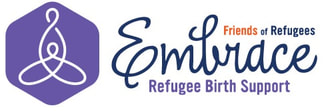
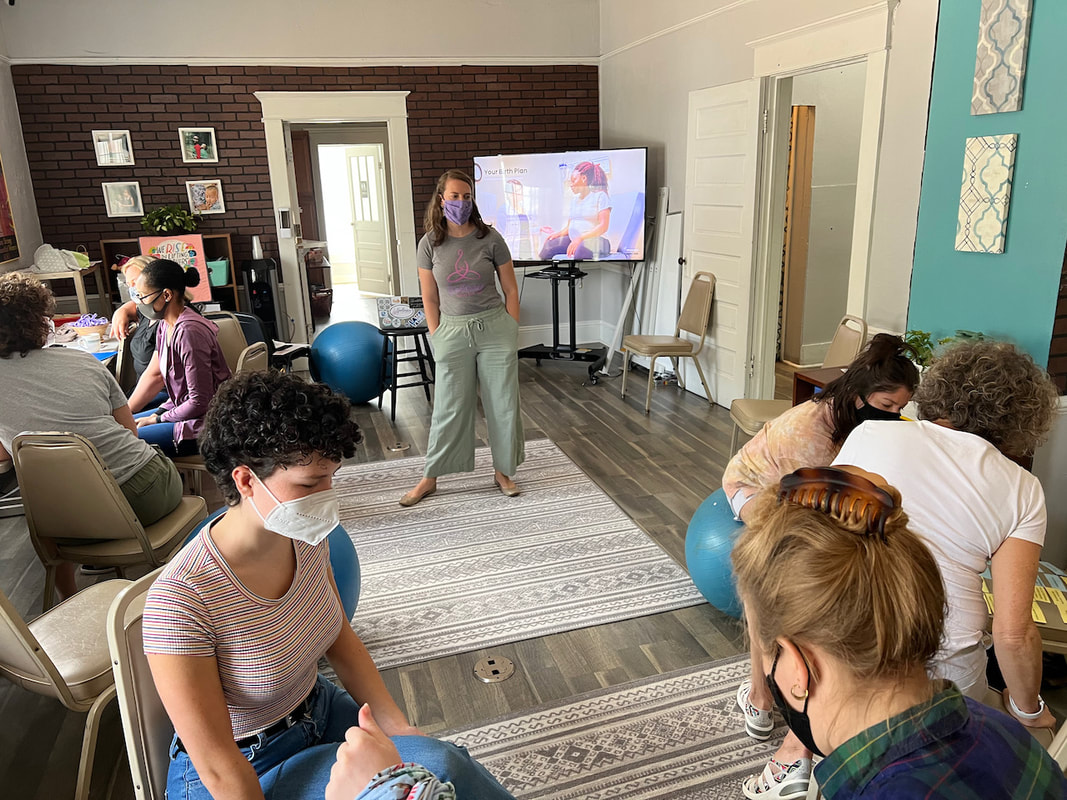
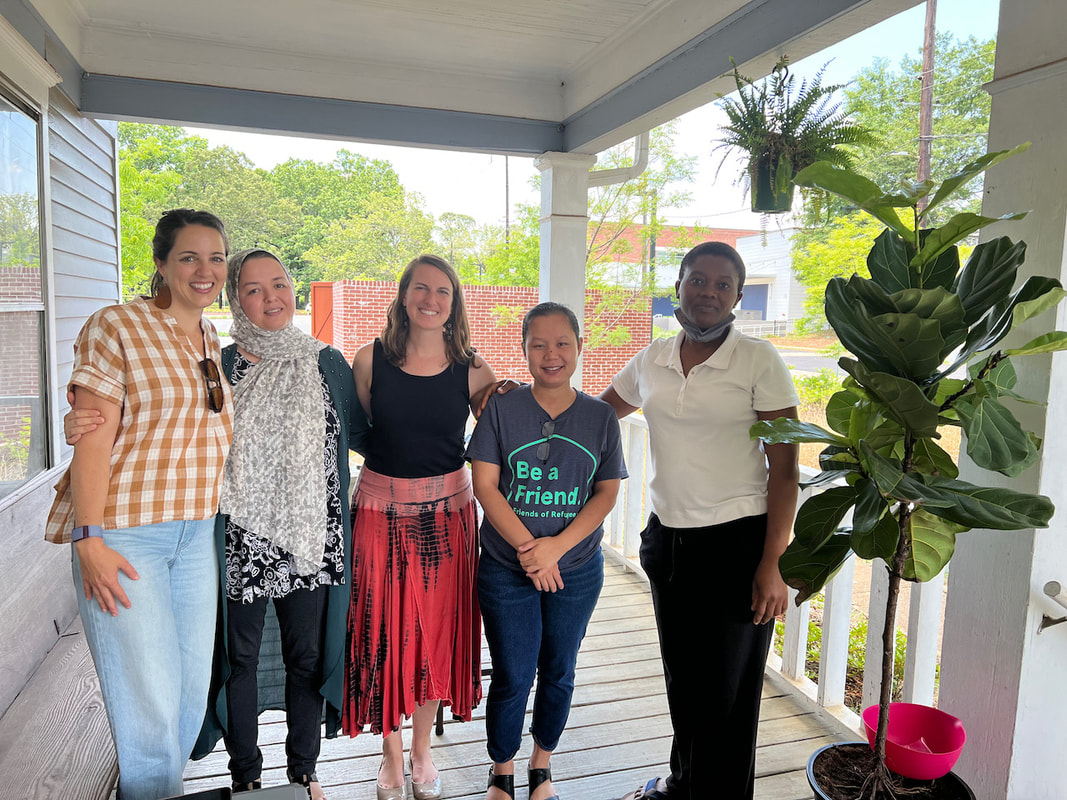
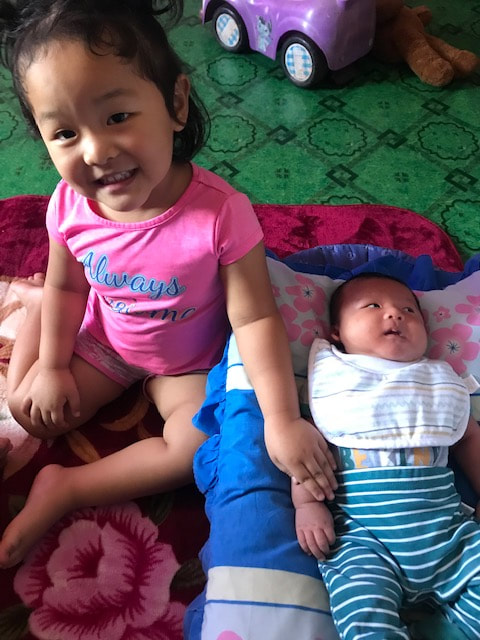
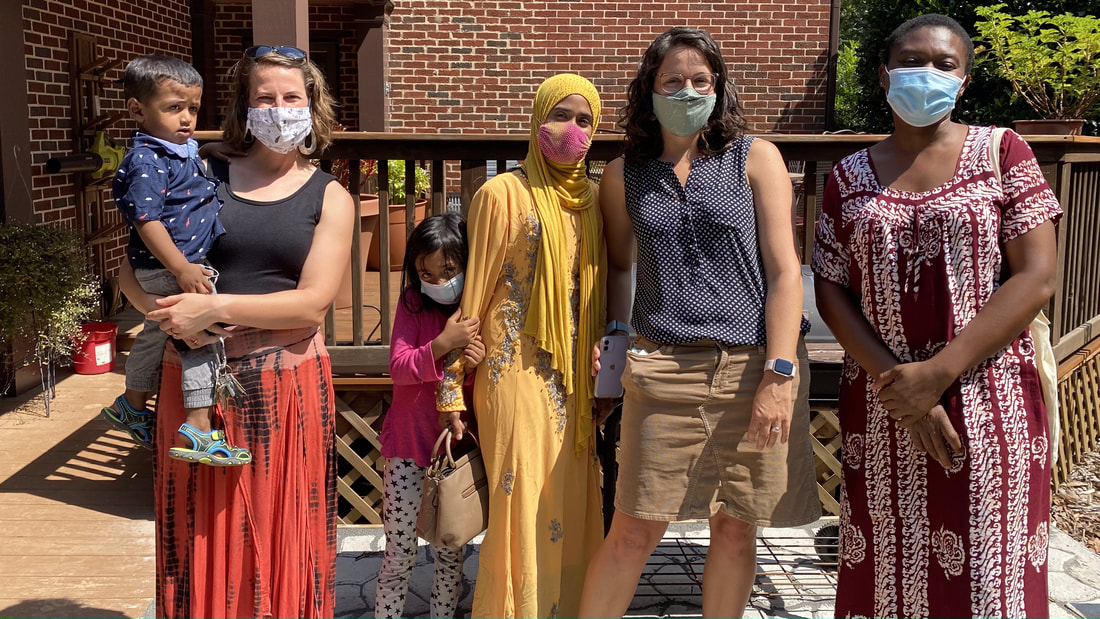

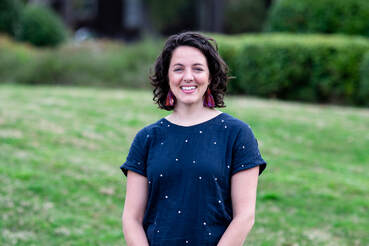
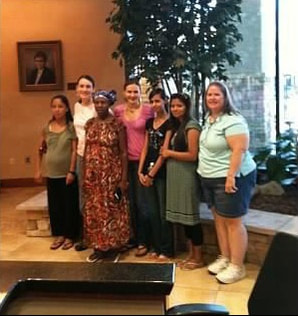
 RSS Feed
RSS Feed
